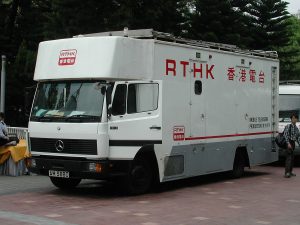For much of its history, Hong Kong’s public broadcaster has fought to remain a bastion of editorial independence in a city facing intensifying crackdowns on press freedom.
Founded in 1928, Radio Television Hong Kong or RTHK is technically a government department that must adhere to a government charter. Yet its programming – which spans multiple languages and platforms – is known for presenting diverse opinions and hard-hitting investigations that strive to hold those with power accountable. Modeled after the BBC, RTHK consistently ranked as one of the city’s most trusted news sources and has resisted many attempts to turn it into a government mouthpiece – both during British colonial rule in the 1980s and later as an organization operating on Chinese soil.
Now, it’s facing unprecedented challenges.
Concerns over RTHK and press freedom have escalated following the arrest of a freelance journalist last week in connection with her work on a prizewinning RTHK investigation. The documentary probed into the delayed police response to a mob attack on protesters in a train station last year, which sparked public outrage. Choy Yuk-ling or Bao Choy, was charged for making a false declaration on a government database after she cited “traffic and transport-related matters” as her purpose in searching for car license information. In the past, searchers could indicate their purpose as “other” while using the database – which is publicly accessible and a commonly used tool – but the category was switched last year.
“I understand this incident is no longer a personal matter but a matter related to public interest and press freedom in Hong Kong,” Choy said outside the court today, according to Reuters. “I truly believe I will not walk alone.”
RTHK’s staff union accused the government of being an “unscrupulous employer” after it denied assistance to Choy, citing her position as a contractor and not a government employee. A guilty verdict could lead to a sentence of up to six months in prison.
It’s the latest in a series of controversies the broadcaster has been embroiled in this year over the neutrality of its programs. In September, RTHK reopened an investigation into Nabela Qoser, a journalist known for tough confrontations with top officials, and extended her probation. In August, a program featuring wanted pro-democracy activist Nathan Law was removed from the website, following the implementation of a sweeping national security law six weeks earlier.
RTHK’s acting deputy director resigned in June after serving in the post for less than a year, and in April a reporter who asked a World Health Organization advisor a question about Taiwan was accused of “breaching the One-China principle.” In May, the government appointed a team to review RTHK’s management. The broadcaster was also forced to suspend “Headliner” – the city’s oldest political satire – after it was issued a warning for “insulting” the police force.
Hari Kumar, former web editor at RTHK who left the post last month after serving for six years, told The Diplomat that reporters have fought to uphold RTHK’s mission to serve the public, despite these challenges. Yet its status as a government media means that authorities can bring in more regulations to control it, he added.
The broadcaster’s future is growing increasingly uncertain, as voices calling for the organization to be reined in continue to become louder. Last month, pro-Beijing lawmaker Junius Ho called for RTHK to be merged with the government’s public relations unit. Regina Ip, another pro-Beijing lawmaker, expressed similar sentiments last year when she questioned whether RTHK should cover news.
As the climate for reporting becomes increasingly hostile, it will be more difficult for journalists to operate in any news organization in Hong Kong. These latest crackdowns, and the vagueness of the national security law, will deter many from going “the extra mile to report,” Kumar said.
“RTHK – they’re still doing what they’re supposed to do. A public broadcaster’s role is to provide real news, not to be a mouthpiece for [the] government or others,” he said. “That is what RTHK has been doing, which is remarkable given the constraints now.”

































